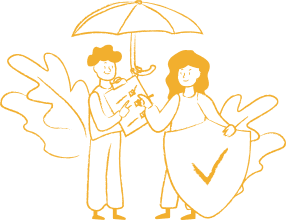Falling Ill as a Tourist or on a Short Stay in Italy
1. You have an EHIC With You
If you fall ill when you are in Italy on a short stay (for less than 90 days) and you have a European Health Insurance Card (EHIC), you can access urgent (emergency) and non-urgent but medically necessary treatment by presenting your EHIC and identity document at the following facilities:
- public health facilities;
- private health facilities or professionals affiliated with the National Health Service (NHS)
Note! EHIC does not cover private healthcare, unless the private healthcare provider is affiliated with the NHS.
EHIC allows you to access Italian healthcare during your short stay on the same terms and at the same price as Italian residents.
This means that medically necessary treatments will be free-of-charge for you, except for when Italian residents pay co-payments for healthcare services (which vary in each region in Italy) – which you will also be required to pay.
Below are some examples of the healthcare services you can access with your EHIC:
- ambulance – usually free of service for EHIC-holders;
- emergency room services – some emergency rooms may require co-payments;
- hospital admissions – free of charge for EHIC-holders, but if you want a private room or other special services, you will pay separate charges;
- primary care out-of-hours service (medical guards) – a free out-of-hours medical service is available from 8 pm to 8 am on weekdays and on a 24-hour basis at weekends and on holidays;
→ during the summer, in Italian regions with high tourist numbers, tourist medical guard’s services are available – for administrative purposes, you will have to pay the entire treatment price upfront, but it is fully refundable by presenting receipts to your national insurance provider;
- specialist visits and laboratory tests – you would have to pay the applicable regional co-payment rates for specialist visits and laboratory tests and you would get a referral for them after an occasional visit to a general practitioner;
- medicines:
→ essential (life-saving) medicines prescribed by general practitioners are normally free of charge, unless regional co-payments apply;
→ non-essential medicines (both prescription and over-the-counter) for diseases considered to be minor are charged entirely to patients;
- pregnancy and childbirth – you can obtain pregnancy-related healthcare in Italy during your short-term stay by presenting your EHIC and identity card, but if you are planning to give birth in Italy, you will have to follow the procedure for scheduled treatment in Italy (by filling out form S2);
- dental care – as a rule, all patients pay the entire treatment price for dental care; there are some public and NHS-affiliated private clinics where you can obtain dental care just at the co-payment rate, but there are normally long waiting lists for such clinics.
2. You are entitled to an EHIC but you don’t have it with you
If you are entitled to an EHIC but don’t have it with you, you will need to pay for any treatment provided by public or private NHS-affiliated facilities upfront.
Once back in your home country, and it is established that the treatment that you received was necessary and that you are entitled to an EHIC, you can ask for reimbursement from your national insurance provider.
Alternatively, with the consent of the Italian healthcare provider where you are about to receive necessary treatment, you can contact your national insurance provider and have them certify, by fax or by email, that you are entitled to an EHIC.
In this case, you will receive treatment under the same conditions as those covered by the Italian NHS, meaning that you won’t have to pay the entire treatment price and will only have to pay applicable co-payments (if any).
3. You are not entitled to an EHIC
If you are on a short stay in Italy and are not entitled to an EHIC – for example, if you are not insured with any EU country public health insurance institution – you will NOT have access to Italian healthcare during your short stay on the same terms and at the same price as Italian residents.
This means that you will have to pay the entire treatment prices upfront and, moreover, you will not be entitled to reimbursements of your medical receipts.
Therefore, if you are not entitled to an EHIC in any EU country, it is recommended that you take out a private health insurance before your trip to Italy.
Access to Italian Healthcare if you Reside in Italy
If you reside in Italy on a regular basis (for more than 90 days), you will have access to Italian public healthcare by registering with the National Health Service (NHS).
There are two different ways to register depending on the reasons for your stay – mandatory and voluntary registration.
Note! The general rule is that your healthcare is extended to your dependent family members who live regularly in Italy.
Below, you can check whether healthcare is mandatory or voluntary in your particular situation.
Mandatory Registration
Mandatory registration is free and is done in the following cases:
- you reside in Italy regularly and are employed by an Italian employer, self-employed, or registered on employment lists;
- you reside in Italy regularly and have requested the renewal of your residence permit (permesso di soggiorno) for:
- employment or self-employment, family reasons, political or humanitarian asylum, asylum request, waiting for adoption, for foster care, and for acquisition of citizenship, as well as for certain cases of medical treatment (foreigners suffering from health conditions deriving from particularly serious pathologies, not adequately treatable in the country of origin)
- the first issue of your residence permit for employment or self-employment;
Mandatory registration is done at ASL (Azienda Sanitaria Locale – Local Health Unit) office where your residence indicated on your residence permit is.
Voluntary Registration
If you are in Italy for more than 90 days and you do not fall under any mandatory registration cases described above, you can opt for a voluntary health insurance by paying an annual flat rate contribution.
Voluntary registration can be done in the following cases:
- students and au-pairs (note that for this particular category, voluntary registration is possible if you are staying in Italy even for less than 90 days);
- those who have elective residence permit and do not carry any work activity (elective residence is a residence permit for individuals with high self-sustaining incomes and financial assets, who have a real necessity to reside in Italy and who can demonstrate a steady income (not from employment) – for more information, see this website);
- religious personnel (otherwise not registered via mandatorily);
- diplomatic and consular workers;
- foreign employees of international organizations operating in Italy;
- foreign participants of volunteering programs;
- parents that are older than 65 years entering Italy for family reunification;
- all other categories that are not falling under mandatory registration procedure.
Annual flat-rate contributions are the following:
- Normal annual flat-rate contributions are calculated based on your income (Italian or abroad) from previous calendar year:
- 7.5% if your income is up to €20,658.28;
- 4% for the amounts between €20,658.28 and €51,645.69;
- In any case, the amount of the contribution cannot be less than € 387,34.
- Students – €149.77 (only if the student has no income other than scholarship or economic subsidies provided by Italian public bodies) and au-pairs – €219.49
Note that if students and au-pairs have dependent family members, then flat-rate contributions indicated in point 1 apply.
What if I Choose not to opt for Voluntary Registration?
If you are in Italy for more than 90 days, your health care registration is not mandatory, and you choose not to opt for voluntary registration, you will either have to use private health insurance, or you will be able to access urgent and other medical services according to the tariffs of the region where the service is received.
Please, note that there might be other possibilities for you to be covered under the Italian healthcare.
If you have questions regarding your particular situation, or if you have any doubts regarding this information, please, get in touch with our experts who will be able to provide you with a professional advice.
Last updated on 31 January 2025






